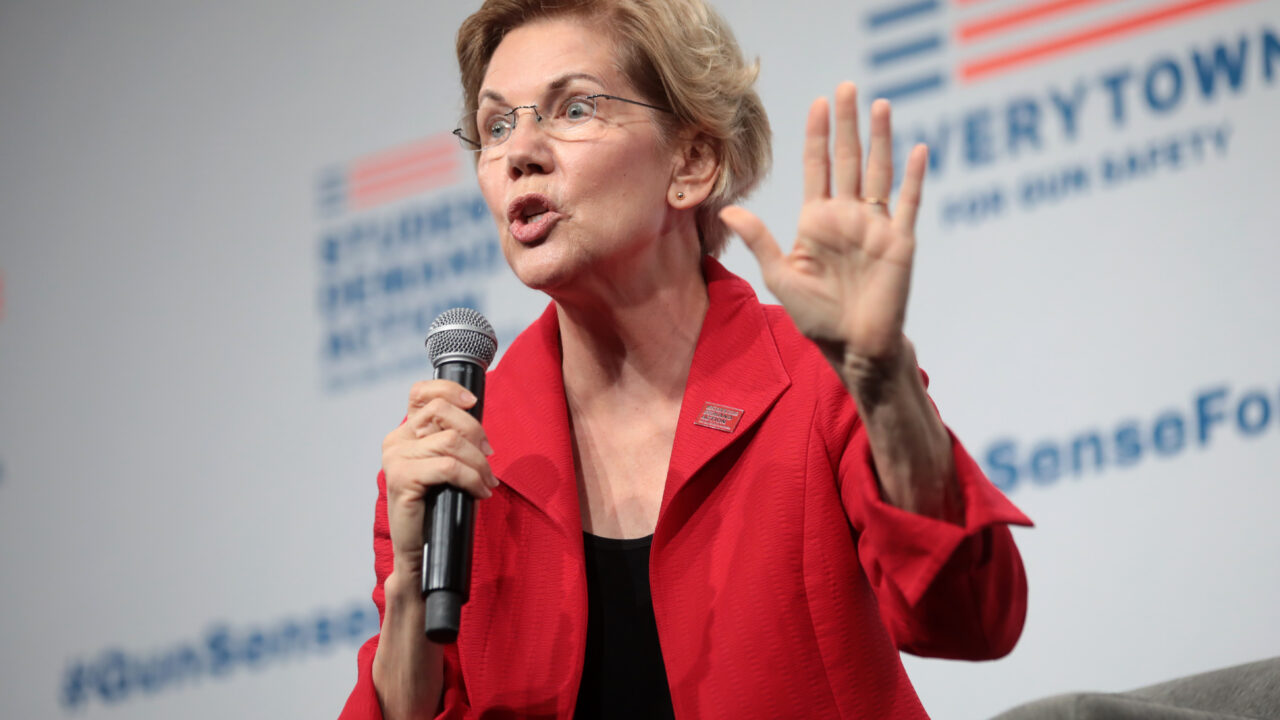 "Elizabeth Warren" by Gage Skidmore is licensed under CC BY-SA 2.0
Link:https://www.flickr.com/photos/gageskidmore/48590080237/
"Elizabeth Warren" by Gage Skidmore is licensed under CC BY-SA 2.0
Link:https://www.flickr.com/photos/gageskidmore/48590080237/
Sen. Elizabeth Warren (D-Massachusetts) announced Tuesday that she is introducing legislation along with Sen. Sheldon Whitehouse (D-Beach Club) to impose a “windfall profits” tax on American oil production.
Like previous Democrat proposals to ban oil exports or suspend the gas tax until after the midterm elections, Warren’s windfall profits tax (WPT) is a gimmick designed to distract voters from the Biden’s Administration’s refusal to increase domestic oil and gas production amid record high gas prices.
Details of Warren’s plan
According to Bloomberg News, Warren’s plan will require oil companies that produce or import at least 300,000 barrels of oil per day to pay a per-barrel tax equal to 50% of the difference between the current price of a barrel and the average price from the years 2015 to 2019.
According to the U.S. Energy Information Administration, the average price of Brent Crude oil from 2015-2019 was roughly $57 per barrel. The U.S. Energy Information Administration’s March Short Term Energy Outlook forecasts crude prices to average $102 per barrel for the second half of 2022.
Warren’s windfall profits tax would likely amount to a $22.50 per barrel tax on oil.
WPT would increase energy costs for consumers
With American consumers already facing record high gas prices now averaging $4.20 per gallon across the U.S., a WPT would lead to higher energy costs as companies pass the tax burden along to consumers in the form of higher prices.
As crude oil is the main ingredient required for blending gasoline, a rise in the price of crude oil would increase the price of gasoline for consumers.
Would Increase reliance on oil imports
Warren’s WPT would discourage domestic production through increased marginal production costs. Decreased domestic production would lead to further reliance on foreign imports. This would come at a time when the U.S. is banning oil imports from Russia and OPEC members refuse to answer President Biden’s phone calls.
Would worsen inflation
Warren’s plan would use the revenue generated from the tax to send cash payments to individuals. The payments would phase out for individuals earning more than $75,000 or couples earning $150,000.
The Covid-19 stimulus payments have proved an outlier causing U.S. inflation. With annual inflation now at 7.9%, increasing taxes on oil to send more cash payments to individuals will only further drive inflation.
Tried and failed policy from the Carter Administration
In 1980, President Jimmy Carter signed the Crude Oil Windfall Profits Tax Act, which imposed a 70% excise tax on the amount of an oil sale price exceeding $12.81 per barrel ($43.71 in 2022 dollars), according to the Tax Foundation.
The Congressional Research Service found that Carter’s windfall profits tax on the oil industry reduced domestic oil production by as much as 8% and caused U.S. dependence on imported oil to increase by as much as 13% from 1980-1988.
The tax was repealed in 1988 with a Democrat-led House and Senate.

